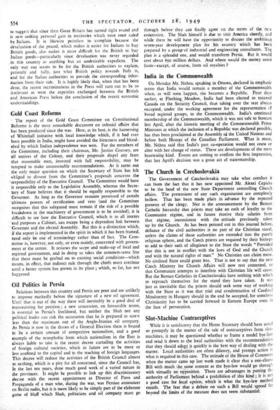Cold Coast Reforms
The report of the Gold Coast Committee on Constitutional Reforms is the most remarkable document on colonial affairs that has been produced since the war. Here, at its best, is the harnessing of 'Whitehall initiative with local knowledge which, if it had ever been possible in India, might have avoided the bitterness and blood- shed by which Indian independence was won. For the members of the Committee, including their chairman, Mr. Justice Coussey. are all natives of the Colony, and their proposals dispel any fears that reasonable men, invested with full responsibility, may be tempted to make unreasonable recommendations. As it turns out the only major question on which the Secretary of State has felt obliged to dissent from the Committee's. proposals concerns the 'responsibility of the Executive Council. The Committee would have it responsible only to the Legislative Assembly, whereas the Secre- tary of State believes that it should be equally responsible to the Governor. As long as the Governor remains possessed of certain Ultimate powers of certification and veto (and the Committee recognises that this safeguard must remain if the risk of a possible breakdown in the machinery of government is to be avoided), it is difficult to see how the Executive Council, which is to all intents end purposes a Cabinet, can escape being a dependent link between "Governor and the elected Assembly. But this is a distinction which, if the report is implemented in the spirit in which it has been framed, heed only be one of terminology rather than of fact. The Com- mittee is, however, not only, or even mainly, concerned with govern- ment at the centre. It reviews the scope and make-up of local and regional government, and in doing so takes the common-sense line that these must be grafted on to existing social conditions—which means, in effect, that indirect rule through the chiefs must continue until a better system has grown in its place ; which, so far, has not happened.






































 Previous page
Previous page